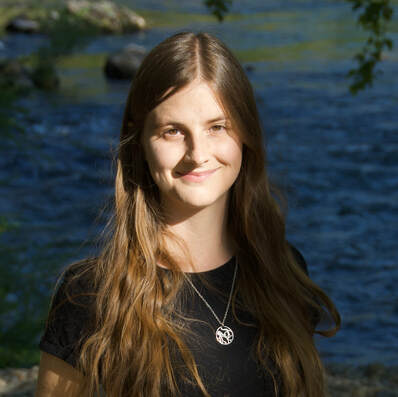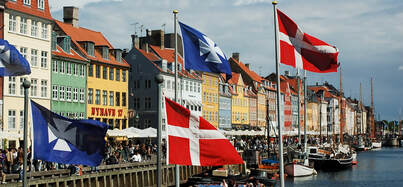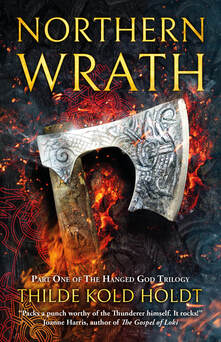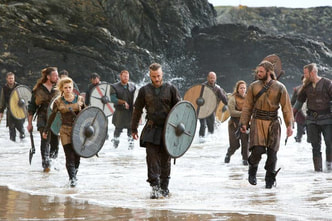|
Welcome Thilde! Thanks for taking some time to chat about writing. First, a few quick-fire questions: Dragons or Griffins? Super spicy or super sweet? And if you were to take an all-expenses paid one week vacation to any of the Nine Realms of Norse mythology, where would you go? Dragons! Super spicy! And uhh… Vanaheim! Since it’s the home of the fertility gods, I think a trip to Vanaheim would include some amazing (maybe even spicy?) foods. Perfect for a relaxing trip. Though you’ve lived all over the world, you originally come from Denmark. My family is from Norway and I have loved visiting, especially when visits involve hikes in the fjords. However, I think that Scandinavian countries (Norway, Sweden, and Denmark in particular) have an inflated international reputation as a kind of ultimate ‘utopia’. Tell us one thing about living in Denmark that isn’t so great that most people might not know about. You’ve probably heard about it from science fiction stories, but a utopian society will inevitably create a lot of rules and laws for the greater good in order to maintain its utopia. Denmark is no different in this regard. Imagine this: it’s a cold windy night and you’re walking home. It’s hailing, windy and there’s not a single car or bike on the road. You’re still going to wait a minute on the sidewalk for the pedestrian sign to turn green. If you get the sudden urge to pay a visit to your Danish friend, then you better call to make an appointment. Don’t you dare just “step by”. Us Danes need time to prepare for the straining social interaction of saying “Hello, how do you do?”. Now you want to buy a car? Hmm… That consumes a lot of fuel, and that’s bad for the environment… Tell you what, if you pay 200% of the car price in taxes we will let it slide… for now. "...a utopian society will inevitably create a lot of rules and laws for the greater good in order to maintain its utopia. Denmark is no different in this regard." While the base principle of protecting everyone with laws and unspoken rules is inherently good, there are many of both in a Utopia like Denmark. Taxes, special duties plus VAT are very high but that’s the price of a utopia. If the government says jump, we jump. I think that’s something that people rarely talk about on the international scale, but as I see it, this is both the reason that Denmark works as a utopia and the reason it’s tough to replicate. You can’t pick and choose. It’s all or nothing. You’ve written several books and so you know what it takes to bring a story from conception to completion. What advice would you give to new authors who are working on their first book and are feeling ‘stuck’ somewhere in the middle? Yes, while only Northern Wrath has been published at the time of this interview, I’ve already written books 2 and 3 in the series and am working on a new series, so I have been down this road before. Often my productivity slows down in the middle of a book, because the excitement I started with has kind of dissolved and the ending seems so very far away. When this is the problem, there is really only one solution that I have found. Writing a little every day until you can see the light at the end of the tunnel. It’s easier to write when it becomes a habit, so keep at it, you’re on the right path! That being said, when I do have good writing habits and then get stuck, it’s usually because I’m on the wrong path. I’ve written myself into a corner and I’m not headed in the right direction anymore. "Often my productivity slows down in the middle of a book, because the excitement I started with has kind of dissolved and the ending seems so very far away." What’s needed in those situations is a reassessment of what I’ve written. I go back to when the text was last working for me, and try to figure out what needs to change going forward for it to continue to work. Once I’ve found the issue, I rewrite the concerned section. Sometimes I catch the potential issue early enough that it can be fixed by simply adapting my plans for future chapters instead. Usually though, some immediate rewriting is needed. To new authors I would say the following. As you write through the tough middle of a book remember the fundamental rule: if the writer is bored, the reader will be bored. When you sit in the middle and are not as energetic as when you started, find something in the story that you find exciting to drive you along. If the writer is having fun, chances are that the reader will too. "To new authors I would say the following. As you write through the tough middle of a book remember the fundamental rule: if the writer is bored, the reader will be bored." Our paths toward Viking fiction seemed to have traced a similar arc in terms of falling down the rabbit-hole of our heritage. In what ways has writing Viking-themed fiction shaped your own personal identity as a Dane and as a citizen of the world? I was born and raised in Denmark, but when I was 10 years old, I moved to France with my family. In France, I quickly fit in, learned the language and made a life for myself, and the longer I lived there and the more I travelled and found other places where I could belong, the more I wondered what my connection to Denmark truly was on a cultural level. Looking into the Vikings gave me an answer. It gave me a connection to Denmark that I previously did not have, even when I lived there as a kid. "Looking into the Vikings gave me an answer. It gave me a connection to Denmark that I previously did not have, even when I lived there as a kid." When my family moved away from Denmark, we took a piece of the Norse culture with us. Not the utopian values described above, but some core cultural traits. There was a focus on the family, a lust for exploration, and hospitality was a prime value that I was taught in the home. These were the main traits we exported from the Norse culture and when I began to research the Vikings, I found all of those same values reflected in the ancient Norse culture (primarily evidenced in the Havamal). Finally, I could explain those pieces of my own hybrid-culture. At last, I could define who I was, and I was that way. Before, the hardest question I knew was: “where are you from?” because it felt like I was not from anywhere. I was not from Denmark and I was not from France, so I could never provide an answer that was satisfying, at least to myself. Now, thanks to the Vikings, I can answer the question more easily, because I am from all of these places. Today I may answer that I am from Denmark. Yesterday I might have said France. Tomorrow I may mention my time in England or my time in South Korea. I have taken a piece of all of these places with me. I am not from any one of them, I am from all of them. Northern Wrath, the first book in your Hanged God trilogy, was released in October, 2020. Walk us through your experience of the launch day and the weeks following: What were the highlights? Any surprises? And what advice would you have for authors with an upcoming debut launch?
My fear about a launch was that it might feel anticlimactic. So, a big surprise to me was that things started happening way before the launch date. ARCs (Advance Reader Copies) came out in June and reviews started to trickle in shortly after that. From June until October, I felt like there was a little something happening every day. Might be someone posting a photo of their ARC, someone posting an early review, or an interview request. A little something almost every day. That meant that launch day was not so much a sudden burst of celebrations soon to be forgotten, but more of a natural conclusion to the building excitement. For authors preparing for their first launch, I would hence say: there are a lot of small things you can do before the launch that will get people excited about your book and get them to pre-order it, and take part. Talk about your book, online or in person, and get some excitement going gradually instead of relying purely on the launch itself. That way you extend the celebrations. It certainly made it a great experience for me. "For authors preparing for their first launch, I would hence say: there are a lot of small things you can do before the launch that will get people excited about your book and get them to pre-order it, and take part." One of the historical themes in Northern Wrath is the erasure of ancient Viking customs as Europe embraced Christianity. What parts of this culture did you really want to highlight through the narrative and what lessons have Vikings from the past taught you about living today? At the forefront of my narrative is the idea that culture dictates everything else. The Vikings acted as they did because of their belief-system, which dictated their culture. If you truly believe that in order to get to the cool afterlife, where the awesome gods feast, you first have to die an honourable death in battle… Well then you have to go out and get into some fights to find those battles. Otherwise there’s absolutely no chance of you ending up in that awesome hall in the afterlife. So, you need to go out and find some epic battles, and if you live on a land surrounded by the sea, then you need some good ships that can both carry you far over tricky waters, and will also double as quick escape vessels. As such the infamous longships appear, and people make their life around these ships. There are, of course, the hopeful warriors who search for a worthy battle, but there are also the ship-makers, the wood-workers, and the weavers who suddenly have plenty of work. A whole community and way of life forms around the simple quest of needing to find a worthy battle. "At the forefront of my narrative is the idea that culture dictates everything else. The Vikings acted as they did because of their belief-system, which dictated their culture." It is no mere coincidence that there was a desperation in other countries to turn the Scandinavians towards Christianity, for their belief is what fueled their way of life. When they eventually did turn to Christianity, that way of life slowly lost meaning and purpose, until it was no longer sustainable. Belief being essential to someone’s culture was an interesting concept to me, and it is really around this idea that I built Northern Wrath. As to lessons from the past, I have learned many things. Most of all I learned a lot from spending my summers sailing with a Viking warship, and I feel like I’m still learning from those continuing experiences. Chief among them is the realisation that while individual quests can be grand, a journey has more meaning when there are others aboard. You can’t sail a warship alone, and even if you did manage it, you would not survive the battle at the other end. Your next series is a fantasy adventure set in ancient Korea, a country in which you have lived and have a deep fascination with. How has the process of historical research been for this new novel compared to your first series as you explore territory across cultural lines and over language barriers? Yes, the Hanged God series has been written, and so while book two and three get ready for publication I’m writing my next series, set in 7th century Korea. Writing historical based fiction has two distinct requirements. The writer evidently needs to do research into the historical era, but they also need to know how to interpret the discoveries they make to modern day audiences. Personally, I have encountered two main challenges in my historical research into Korea. The first was a lack of accessibility to primary sources. Most of the material I base my research on for this up-coming series is only available in Korean, but since I both speak and read Korean, there was no significant language barrier for me. Except on the occasions that involved texts written in Hanja with no transcriptions into modern day Korean script. Language was not the issue, but there has been much less research done into this era of Korean history compared to the Viking Age in Scandinavia. A lot of what has been done I was only able to access while being in Korea. Thankfully, in 2019, before the world shut down, I was able to take research trips across Korea. I visited all of the important sites, visited museums, and located elusive texts at distant libraries. I was also able to learn traditional Korean archery, which became integral to the story. I learned a lot during that time, and without that trip I would not be able to write this story. Writing from half-way across the world, I would not be able to acquire about 70% of the knowledge I gained during that time. "I visited all of the important sites, visited museums, and located elusive texts at distant libraries. I was also able to learn traditional Korean archery, which became integral to the story." The second issue I encountered is a little more complex. Let me explain… When I was doing research into the Vikings, I started with the same knowledge base as most Danes and Scandinavians. There were certain things about the Vikings that I knew, and other things I thought I knew that were completely wrong. This meant that I had a really good grasp on what most people in modern day Scandinavia knew about the historical period I was writing about and I also knew what misconceptions I had to fight in the text. With the Korean story though, I did not start with the same knowledge base as most Koreans. Finding out what kind of basic knowledge most Koreans have about the period presented a challenge for me. Every time I asked, I received wildly different answers. To solve this issue, I ended up having to look into the base history curriculum taught in Korean schools and comb through history books made for school kids. "Finding out what kind of basic knowledge most Koreans have about the period presented a challenge for me. Every time I asked, I received wildly different answers... I ended up having to look into the base history curriculum taught in Korean schools and comb through history books made for school kids." Last, but not least, where can readers buy a copy of Northern Wrath and where should they go to keep track of your upcoming publications? Northern Wrath can be found or ordered at any bookshop. Links to buy can be found on my website. News about upcoming projects can also be found on the site. Otherwise, I check Twitter whenever I’m summoned, and happily engage there. So, if you want to interact that is where I can be found.
0 Comments
Leave a Reply. |
AuthorJoshua Gillingham is an author, editor, and game designer from Vancouver Island, Canada. Archives
April 2022
Categories
All
|





 RSS Feed
RSS Feed
